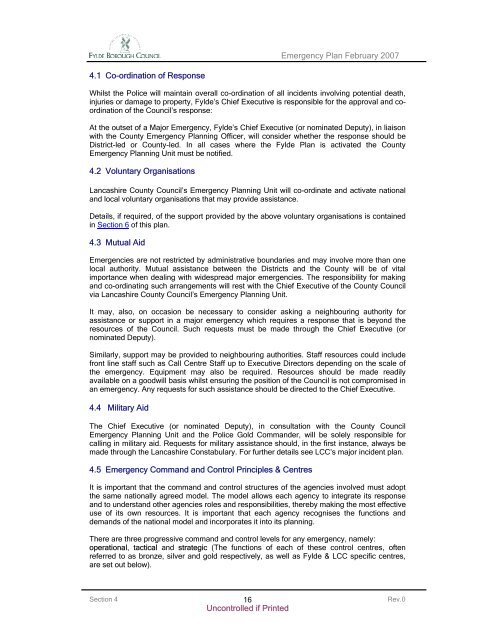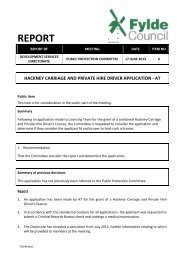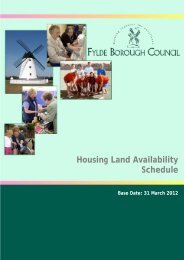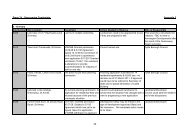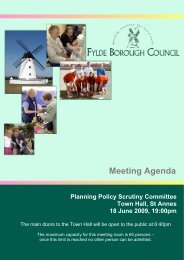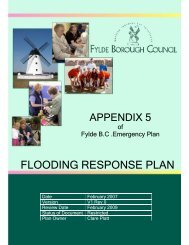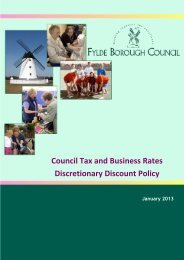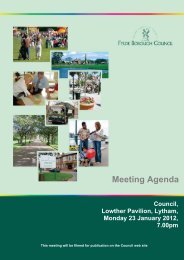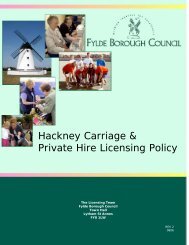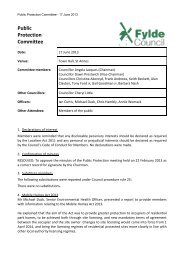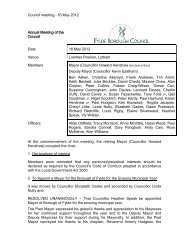Emergency Plan - Fylde Borough Council
Emergency Plan - Fylde Borough Council
Emergency Plan - Fylde Borough Council
You also want an ePaper? Increase the reach of your titles
YUMPU automatically turns print PDFs into web optimized ePapers that Google loves.
<strong>Emergency</strong> <strong>Plan</strong> February 2007<br />
4.1 Co-ordination of Response<br />
Whilst the Police will maintain overall co-ordination of all incidents involving potential death,<br />
injuries or damage to property, <strong>Fylde</strong>’s Chief Executive is responsible for the approval and coordination<br />
of the <strong>Council</strong>’s response:<br />
At the outset of a Major <strong>Emergency</strong>, <strong>Fylde</strong>’s Chief Executive (or nominated Deputy), in liaison<br />
with the County <strong>Emergency</strong> <strong>Plan</strong>ning Officer, will consider whether the response should be<br />
District-led or County-led. In all cases where the <strong>Fylde</strong> <strong>Plan</strong> is activated the County<br />
<strong>Emergency</strong> <strong>Plan</strong>ning Unit must be notified.<br />
4.2 Voluntary Organisations<br />
Lancashire County <strong>Council</strong>’s <strong>Emergency</strong> <strong>Plan</strong>ning Unit will co-ordinate and activate national<br />
and local voluntary organisations that may provide assistance.<br />
Details, if required, of the support provided by the above voluntary organisations is contained<br />
in Section 6 of this plan.<br />
4.3 Mutual Aid<br />
Emergencies are not restricted by administrative boundaries and may involve more than one<br />
local authority. Mutual assistance between the Districts and the County will be of vital<br />
importance when dealing with widespread major emergencies. The responsibility for making<br />
and co-ordinating such arrangements will rest with the Chief Executive of the County <strong>Council</strong><br />
via Lancashire County <strong>Council</strong>’s <strong>Emergency</strong> <strong>Plan</strong>ning Unit.<br />
It may, also, on occasion be necessary to consider asking a neighbouring authority for<br />
assistance or support in a major emergency which requires a response that is beyond the<br />
resources of the <strong>Council</strong>. Such requests must be made through the Chief Executive (or<br />
nominated Deputy).<br />
Similarly, support may be provided to neighbouring authorities. Staff resources could include<br />
front line staff such as Call Centre Staff up to Executive Directors depending on the scale of<br />
the emergency. Equipment may also be required. Resources should be made readily<br />
available on a goodwill basis whilst ensuring the position of the <strong>Council</strong> is not compromised in<br />
an emergency. Any requests for such assistance should be directed to the Chief Executive.<br />
4.4 Military Aid<br />
The Chief Executive (or nominated Deputy), in consultation with the County <strong>Council</strong><br />
<strong>Emergency</strong> <strong>Plan</strong>ning Unit and the Police Gold Commander, will be solely responsible for<br />
calling in military aid. Requests for military assistance should, in the first instance, always be<br />
made through the Lancashire Constabulary. For further details see LCC’s major incident plan.<br />
4.5 <strong>Emergency</strong> Command and Control Principles & Centres<br />
It is important that the command and control structures of the agencies involved must adopt<br />
the same nationally agreed model. The model allows each agency to integrate its response<br />
and to understand other agencies roles and responsibilities, thereby making the most effective<br />
use of its own resources. It is important that each agency recognises the functions and<br />
demands of the national model and incorporates it into its planning.<br />
There are three progressive command and control levels for any emergency, namely:<br />
operational, tactical and strategic (The functions of each of these control centres, often<br />
referred to as bronze, silver and gold respectively, as well as <strong>Fylde</strong> & LCC specific centres,<br />
are set out below).<br />
Section 4<br />
16<br />
Uncontrolled if Printed<br />
Rev.0


